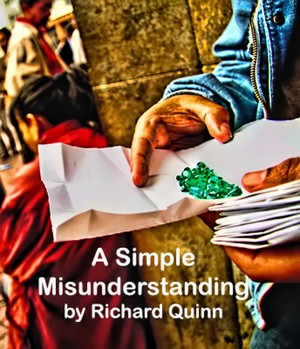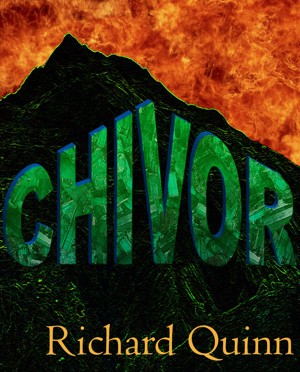Location: United States
Member Since:
May 07, 2011
Richard Quinn
Biography
In everyone’s life, there are a certain number of events or decisions, call them forks in the road, that influence just about everything that happens to us from that point forward. We pick one school or career over another, we meet the person who becomes our partner, we cross the street without looking and get hit by a truck. Fate? Serendipity? Random chance? Whatever you want to call it, these pivotal moments aren’t always obvious at the time, but they’re clear as a bell in retrospect, and when you string them all together, they define who we are more surely than our DNA.
A case in point for me personally is something that happened in January of 1971, when I was a 20 year old student at Antioch College in Ohio. Born and raised in the Arizona desert, I was fed up with snowy mid-western winters, so I took a break from school, pointed myself south, stuck out my thumb at the side of a road, and dropped off the edge of the world. When I re-emerged, three months later, I’d covered a distance of nearly 7,000 miles, almost all of it by land. I’d crossed the Andes mountain range six times, I’d camped overnight in the ruins at Machu Picchu, I’d traveled the length of the Atacama desert with a circus, and I’d finally fetched up on the shores of a turquoise lake in southern Chile, near the ultimate end of the road in Tierra del Fuego. I hadn’t planned that trip, and had only the vaguest notion of what I was getting into when I started. I just sort of spontaneously DID it, and the overall experience was literally life changing. When I got back to school, I switched my major from psychology to anthropology, and three months after that, I returned to South America. I completed my studies independently, doing field work at an "off-catalog" archaeological site on the Caribbean coast of Colombia, as well as ethnographic research high up in the snow-capped mountains immediately above those coastal ruins, among the descendants of the people who had built them, as much as a thousand years before.
All told, I spent the best part of five years in the northern Andes. Some of my field work was formally sanctioned by a Colombian University, and by the Colombian National Museum. The rest of it, quite frankly, was not, but either way, it was the real deal--Indiana Jones without the stunt doubles and the special effects. I slogged through unmapped jungles and climbed lofty peaks in search of lost ruins--and I actually found a few. I dug for buried treasure, and I found a bit of that as well. I spent time with remote tribes who were living in a world so distant from ours that it may as well have been another planet, and I viewed wild, exotic landscapes that are the stuff of mist-shrouded dreams.
All of that was exciting, often exhilarating, but it most certainly wasn't an easy way to make a living, because Colombia, back in the 1970’s, was not an easy place to be. What started out as great good fun got pretty serious when a landslide and flood wiped out my house. Then there were the potentially deadly tropical fevers, the anti-government riots with stone-throwing mobs faced off against troops armed with machine guns, not to mention the drug cartels, the corrupt militias, and the occasional stray bullet whizzing past my ear. I wasn't looking for that kind of trouble, but when it's everywhere around you, it's impossible to avoid.
There were times when the trouble got quite personal: while living and working in Colombia, I was the victim of robbery, assault, extortion, false arrest and imprisonment, and the target of an attempted kidnapping. I survived earthquakes, killer volcanoes, a serious machete wound, and at least one shrieking, screaming, blood-on-the-highway bus wreck. If what I've just described sounds more like an ordeal than an adventure, I’d have to say that every grand adventure extracts a price, and in my case, the positives I encountered were well worth any hardship I might have endured. I came to know those mountains and their people in a way touched me to my core, and I experienced beauty of an intensity that’s both rare and noble.
More than four decades have passed since that day when I set out hitch-hiking south, and I’ve had many other life-changing moments in the interim, many more shiny pearls in the strand of my personal destiny. Looking back now, as I head toward retirement, I can’t help focusing on THAT one. Because that one? Man, oh man, that one was really a doozy.
Chivor, my first major work of fiction, draws heavily on my experience during that period of time. Guajira, the second volume in the Chivor trilogy, is well underway, and should be complete sometime next year.
A case in point for me personally is something that happened in January of 1971, when I was a 20 year old student at Antioch College in Ohio. Born and raised in the Arizona desert, I was fed up with snowy mid-western winters, so I took a break from school, pointed myself south, stuck out my thumb at the side of a road, and dropped off the edge of the world. When I re-emerged, three months later, I’d covered a distance of nearly 7,000 miles, almost all of it by land. I’d crossed the Andes mountain range six times, I’d camped overnight in the ruins at Machu Picchu, I’d traveled the length of the Atacama desert with a circus, and I’d finally fetched up on the shores of a turquoise lake in southern Chile, near the ultimate end of the road in Tierra del Fuego. I hadn’t planned that trip, and had only the vaguest notion of what I was getting into when I started. I just sort of spontaneously DID it, and the overall experience was literally life changing. When I got back to school, I switched my major from psychology to anthropology, and three months after that, I returned to South America. I completed my studies independently, doing field work at an "off-catalog" archaeological site on the Caribbean coast of Colombia, as well as ethnographic research high up in the snow-capped mountains immediately above those coastal ruins, among the descendants of the people who had built them, as much as a thousand years before.
All told, I spent the best part of five years in the northern Andes. Some of my field work was formally sanctioned by a Colombian University, and by the Colombian National Museum. The rest of it, quite frankly, was not, but either way, it was the real deal--Indiana Jones without the stunt doubles and the special effects. I slogged through unmapped jungles and climbed lofty peaks in search of lost ruins--and I actually found a few. I dug for buried treasure, and I found a bit of that as well. I spent time with remote tribes who were living in a world so distant from ours that it may as well have been another planet, and I viewed wild, exotic landscapes that are the stuff of mist-shrouded dreams.
All of that was exciting, often exhilarating, but it most certainly wasn't an easy way to make a living, because Colombia, back in the 1970’s, was not an easy place to be. What started out as great good fun got pretty serious when a landslide and flood wiped out my house. Then there were the potentially deadly tropical fevers, the anti-government riots with stone-throwing mobs faced off against troops armed with machine guns, not to mention the drug cartels, the corrupt militias, and the occasional stray bullet whizzing past my ear. I wasn't looking for that kind of trouble, but when it's everywhere around you, it's impossible to avoid.
There were times when the trouble got quite personal: while living and working in Colombia, I was the victim of robbery, assault, extortion, false arrest and imprisonment, and the target of an attempted kidnapping. I survived earthquakes, killer volcanoes, a serious machete wound, and at least one shrieking, screaming, blood-on-the-highway bus wreck. If what I've just described sounds more like an ordeal than an adventure, I’d have to say that every grand adventure extracts a price, and in my case, the positives I encountered were well worth any hardship I might have endured. I came to know those mountains and their people in a way touched me to my core, and I experienced beauty of an intensity that’s both rare and noble.
More than four decades have passed since that day when I set out hitch-hiking south, and I’ve had many other life-changing moments in the interim, many more shiny pearls in the strand of my personal destiny. Looking back now, as I head toward retirement, I can’t help focusing on THAT one. Because that one? Man, oh man, that one was really a doozy.
Chivor, my first major work of fiction, draws heavily on my experience during that period of time. Guajira, the second volume in the Chivor trilogy, is well underway, and should be complete sometime next year.
Books
A Simple Misunderstanding
by Richard Quinn
Price:
Free!
Words: 2,450.
Language:
English.
Published: August 14, 2011
.
Categories:
Fiction » Adventure » General
Paul O’Shaughnessy is an American con man on the run from the FBI, hiding out in Bogotá, the Colombian capital. He’s running his latest scam from a bar stool in the lounge at the Hotel Tequendama, and when he finally gets a fish on his line, he reels in a pocketful of hot emeralds, and a lot more trouble than he bargained for.
Chivor
by Richard Quinn
Price:
$0.99 USD.
Words: 133,360.
Language:
English.
Published: August 14, 2011
.
Categories:
Fiction » Adventure » General
Chivor is an action/adventure tale set in Colombia, a corrupt tropical paradise where drug cartels battle masked guerrillas. An American adventurer gets caught in the middle, risking an ancient cache of emeralds worth billions, and the life of the woman he loves.


